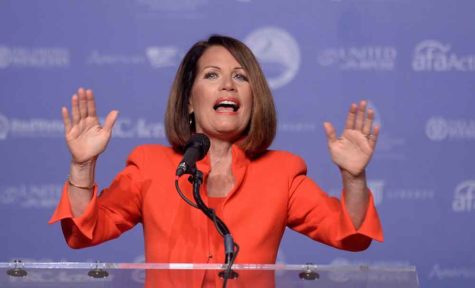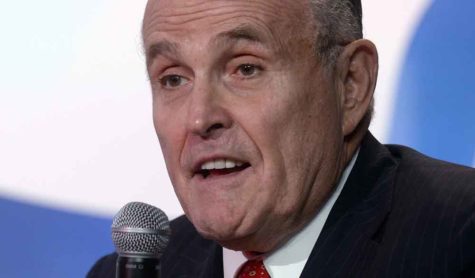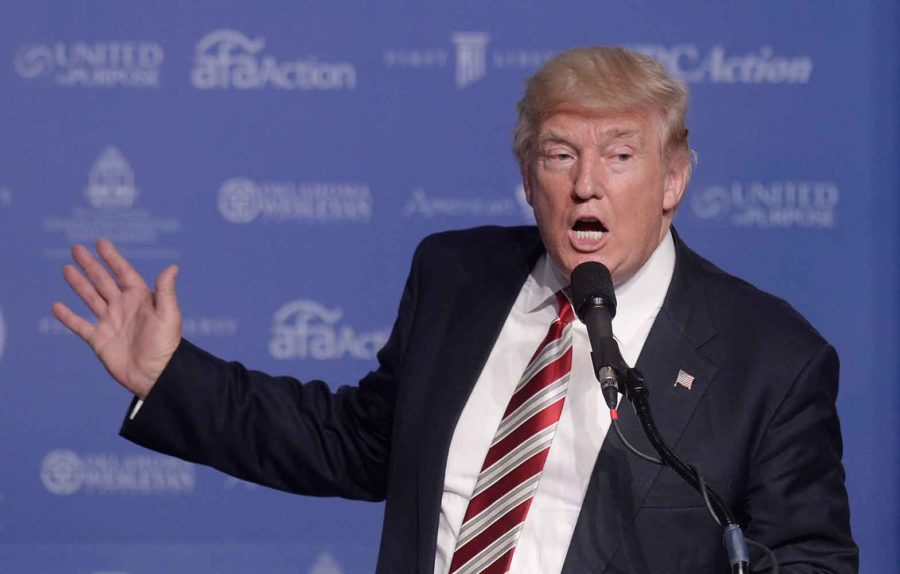Will religious voters embrace this Trump?
Republican presidential nominee Donald Trump speaks at the 11th annual Values Voter Summit on Friday, Sept. 9, 2016 in Washington, D.C. (Olivier Douliery/Abaca Press/TNS)
September 10, 2016
WASHINGTON — Republican presidential candidate Donald Trump arrived at Friday’s Values Voter Summit with the Christian conservative vote in hand — but not firmly.
That’s why Trump — and running mate Mike Pence on Saturday — became the first presidential ticket to address this annual conference of faith-based voters. Trump sought to reassure attendees that he is indeed one of them — committed to family values, school choice and appointing conservative judges who’ll restore religious freedoms that this vital voting bloc feels are under siege.
“A Trump administration, our Christian heritage will be cherished, protected, defended like you have never seen before. Believe me,” Trump told a welcoming crowd assembled in a ballroom. “And that includes religious liberty.”
Advertisement
Faith-based voters are coalescing around Trump, but they aren’t enthusiastic about it. They’re motivated by the fear of a Hillary Clinton presidency in which she could tilt the Supreme Court decidedly left with the selection of one, possibly two, justices.
However, many are still nervous about Trump, concerned about his beliefs on social issues such as gay rights, his bombastic persona and the personal lifestyle of the thrice-married, twice-divorced New York real estate mogul and former reality-television host.

Rep. Michele Bachmann speaks at the 11th annual Values Voter Summit on Friday, Sept. 9, 2016 in Washington, D.C. (Olivier Douliery/Abaca Press/TNS)
A Pew Research poll in July found that 78 percent of self-identified white evangelicals plan to vote for Trump in November but that half of the respondents weren’t satisfied with their ballot options.
More worrisome, 45 percent of white evangelicals said their Trump votes would mainly represent votes against Clinton, while 30 percent said their Trump votes represented support for him.
“There are lots of unknowns about him,” said Abraham Hamilton, 31, a New Orleans attorney and public policy analyst for the American Family Association, a group that promotes fundamentalist Christian values. “But it’s a known question of what to expect from Hillary Clinton. I can’t say I’m OK with it, but I’m more OK with it than the prospect of Hillary Clinton.”
Don Krahel, an 85-year-old retiree from St. Clairsville, Ohio, said Trump wasn’t his “first choice and not my second choice.”
“Now he’s my only choice, and I’m behind him,” Krahel said. “I sent him money. It’s about the Supreme Court for me.”
Trump did his best to woo skeptics. He had faith-based conservative heavyweights like former Rep. Michele Bachmann, R-Minn., and former New York Mayor Rudy Giuliani vouch for him before he took the stage. Trump told the audience that he would attend the funeral Saturday of social conservative icon Phyllis Schlafly, who died earlier this week at 92.
Advertisement*

Former New York City Mayor Rudy Giuliani speaks at the 11th annual Values Voter Summit on Friday, Sept. 9, 2016 in Washington, D.C. (Olivier Douliery/Abaca Press/TNS)
Trump restated his commitment to appointing justices in the mold of the late Antonin Scalia, reminding the audience that he already has a list of 11 potential candidates.
“The next president will not only have to fill this seat, but as many as four others,” he said. “It would be record-setting … . And you pick the wrong people, you have a country that is no longer your country. It will be a disaster.”
He drew the largest applause when he vowed to repeal the so-called Johnson Amendment, a 1954 tax measure introduced by then-Sen. Lyndon Johnson that prevents churches or other tax-exempt charitable groups from endorsing or opposing political candidates. Several church groups say the measure restricts their free speech rights.
“I figure it’s the only way I’m getting to heaven,” he said. “So we’re going to get rid of it, and we’re going to let your great people speak, and you’re going to see something happen that’s going to be very, very good, OK? So important.”
He blasted an Obama administration plan to admit Syrian refugees and accused President Barack Obama of bungling the battle against the Islamic State.
“ISIS is hunting down and exterminating what it calls the nation of the cross,” Trump said. “ISIS is carrying out a genocide against Christians in the Middle East. We cannot let this evil continue — can’t let it.”
Barry Lynn, the executive director of Americans United for Separation of Church and State, accused faith-based Trump supporters of hypocrisy for backing him.
“This election season has exposed the leadership of the religious right for the hypocrites that they are,” said Lynn. “What tiny bit of moral authority the religious right had left disappeared when they tossed the moral values they supposedly treasure under the Trump campaign bus before jumping aboard.”
Corey Spangler, 70, said she’d left Trump’s speech more energized about voting for him in November than before.
“I believe he’s a Christian,” said Spangler, a Lady Lake, Fla., resident. “I’ve evolved. The more I listen to him, the more I like what I hear. I didn’t like some of the bombastic things he said at first. But he’s evolved. He’s changed. He’s more presidential. I’m comfortable with him as my president.”
Hamilton exited Trump’s speech feeling the same way he did before the GOP presidential nominee spoke.
“We’re not just holding our noses,” Hamilton said, “we’re on our knees.”
___
(c)2016 McClatchy Washington Bureau
Visit the McClatchy Washington Bureau at www.mcclatchydc.com
Distributed by Tribune Content Agency, LLC.
Advertisement









